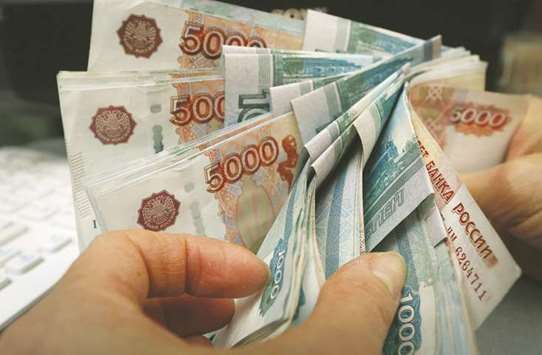Russia’s neighbours are hopeful their economies prove more resilient than their currencies have been to the fallout from the latest round of US sanctions.
Led by a plunge of more than 7% in Russia’s currency, Kazakhstan’s tenge and the Belarusian rouble are among the world’s 12 worst performers this month against the dollar, followed closely by Georgia’s lari. But from Kazakhstan, an oil-rich nation about the size of western Europe, to the Black Sea nation of Georgia, one of the smaller countries to emerge after the Soviet breakup, their top officials believe they can get away without suffering too much more damage.
“There will be no direct impact from sanctions, as well as counter-sanctions, on the economy of Kazakhstan,” its finance minister, Bakhyt Sultanov, said in an interview in Washington, where he was attending the spring meetings of the International Monetary Fund.
Almost three decades after the countries went their separate ways, the region remains closely intertwined with Russia through trade, capital and migration. It’s the top trading partner for Kazakhstan and Belarus, which are all members of a customs union. For Georgia, trade with Russia ranks second, as the nations have mended their ties after a war a decade ago.
“We believe that the economy is pretty robust to external shocks,” Georgian Finance Minister Mamuka Bakhtadze said in an interview in Washington. Georgia “can, at any time, find some other market in case, for example, demand will be lower in Russia.”
As the noose of sanctions tightens around Russia, it’s increasingly turning into a laggard in a region whose gross domestic product the IMF predicts will grow 2.2% this year. Once the bellwether for the Commonwealth of Independent States, a loose grouping of former Soviet republics, Russia’s projected growth of 1.7% in 2018 and 1.5% in 2019 will be the slowest among its peers, according to the IMF. By contrast, Georgia expects a GDP gain of “no less than” 5% in 2018, about the same as in 2017, with foreign direct investment coming in better than last year, Bakhtadze said. Meanwhile, its exports to Russia are growing faster than 20%, he said.
Financial markets across the region remain far from immune, with the Kazakh central bank selling foreign currency for the finance ministry during a bout of volatility in the tenge.
The World Bank has warned that “any deceleration or volatility of economic activity in Russia” could hurt Belarus by undermining its competitiveness and via other channels. Sultanov concedes that Kazakhstan is indirectly vulnerable to “problems in Russia’s economic processes” through trade and the exchange rate and has discussed preparations in case of further depreciation in the rouble.
Still the countries are at pains to emphasize their differences, with National Bank of Kazakhstan Governor Daniyar Akishev saying the reaction to events in Russia was “short-term and moderate.” Days after turmoil in Russia, where the rouble suffered its steepest drop since June 2015, Kazakhstan cut interest rates for a third time this year.
Belarusian president Alexander Lukashenko has said that his country has embarked on market diversification and cut trade with Russia by as much as 5%.
Kazakhstan has held consultations with US officials and was assured that any American actions targeting Russia “will try not to harm the economies of other countries in the region,” Sultanov said.
Besides building stronger links to China, Europe and elsewhere, former Soviet nations are confident they have the right policies to ride out the shock-waves ricocheting from Russia. In the case of Georgia, it’s relying on its free float and close oversight of the financial industry, according to central bank Governor Koba Gvenetadze.
“With these approaches, we think that we’ll be able to withstand any potential shocks in the future,” he said. “We’re a small open economy, so we can often experience the spillover impact of regional or world events.”

An employee counts rouble banknotes at a shop selling home appliances in Krasnoyarsk, Russia. Led by a plunge of more than 7% in Russia’s currency, Kazakhstan’s tenge and the Belarusian rouble are among the world’s 12 worst performers this month against the dollar, followed closely by Georgia’s lari.
